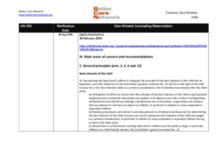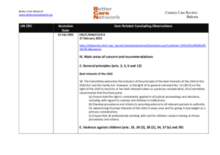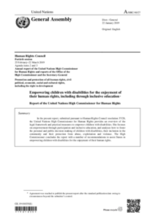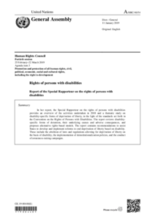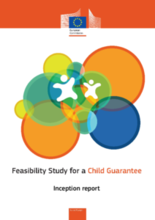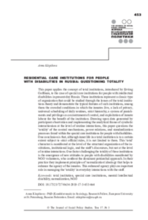Displaying 211 - 220 of 494
This country care review includes the care-related Concluding Observations adopted by the Committee on the Rights of Persons with Disabilities and the Committee on the Rights of the Child.
This country care review includes the care-related Concluding Observations adopted by the Committee on the Rights of the Child.
In this exploratory study, through use of an online anonymous survey, local county child welfare caseworkers were asked to self-rate their knowledge of, exposure to, and comfort levels with children with developmental disabilities.
In the present report, submitted pursuant to Human Rights Council resolution 37/20, the United Nations High Commissioner for Human Rights provides an overview of the legal framework and practical measures to empower children with disabilities.
In her report, the Special Rapporteur on the rights of persons with disabilities provides an overview of the activities undertaken in 2018 and a thematic study on disability-specific forms of deprivation of liberty, in the light of the standards set forth in the Convention on the Rights of Persons with Disabilities.
Guided by social-ecological theory, this study explores responses to violence against children with disabilities, including preventative measures and treatment of victims in the West African countries of Guinea, Niger, Sierra Leone, and Togo.
Building on discourse analyses of custody deprivation cases, the authors of this paper call for greater understanding of how disability intersects with parenting and the need for an improved support system.
This article gives specific information on a program in Missouri, USA that took the emerging therapeutic foster family approach and added a novel component: training deaf families to become therapeutic foster parents, including how it was established, what problems arose, and what solutions were tried.
This report - prepared for the European Commission by Applica and the Luxembourg Institute of Socio-Economic Research (LISER), in close collaboration with Eurochild and Save the Children - provides a first mapping of the situation across the 28 Member States of the EU outlining the situation in relation to children, particularly the four target groups (TGs) of disadvantaged children (children in institutions, children with disabilities, children of recent migrants and refugees, and children living in precarious family situations) as well as an indication of the key issues in relation to children’s access to the five policy areas (PAs): housing, healthcare, nutrition, early childhood education and care, and education.
This paper applies the concept of total institutions, introduced by Erving Goffman, to the case of special care institutions for people [including children] with intellectual disabilities in present-day Russia.

